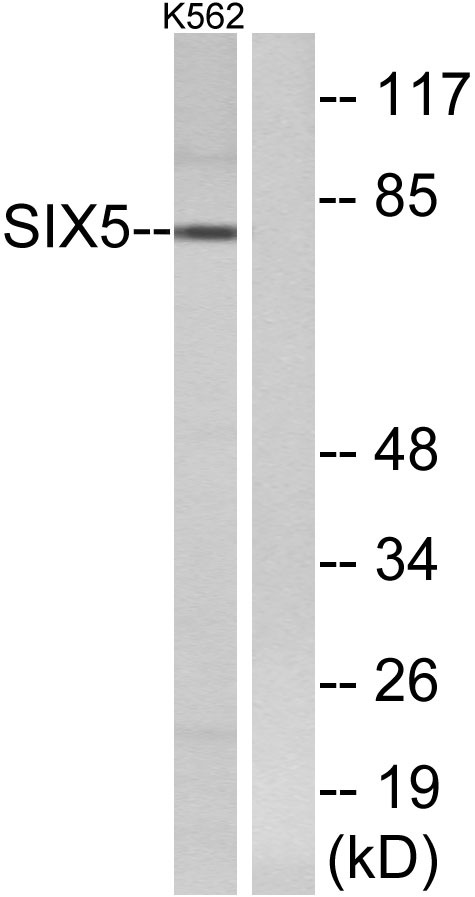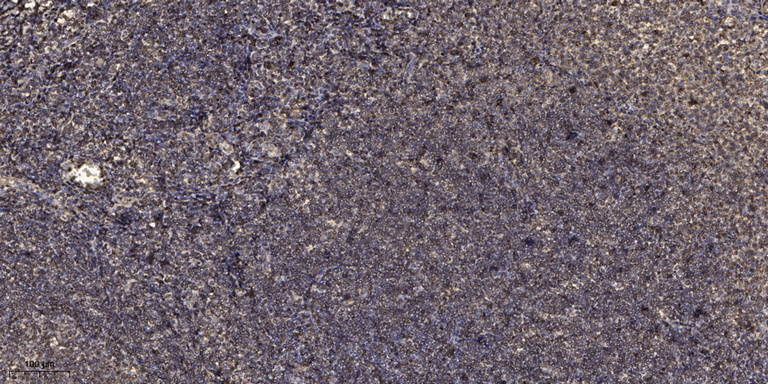Six5 Polyclonal Antibody
- Catalog No.:YT4308
- Applications:WB;IHC
- Reactivity:Human;Mouse
- Target:
- Six5
- Gene Name:
- SIX5
- Protein Name:
- Homeobox protein SIX5
- Human Gene Id:
- 147912
- Human Swiss Prot No:
- Q8N196
- Mouse Gene Id:
- 20475
- Mouse Swiss Prot No:
- P70178
- Immunogen:
- The antiserum was produced against synthesized peptide derived from human SIX5. AA range:201-250
- Specificity:
- Six5 Polyclonal Antibody detects endogenous levels of Six5 protein.
- Formulation:
- Liquid in PBS containing 50% glycerol, 0.5% BSA and 0.02% sodium azide.
- Source:
- Polyclonal, Rabbit,IgG
- Dilution:
- WB 1:500-2000;IHC 1:50-300
- Purification:
- The antibody was affinity-purified from rabbit antiserum by affinity-chromatography using epitope-specific immunogen.
- Concentration:
- 1 mg/ml
- Storage Stability:
- -15°C to -25°C/1 year(Do not lower than -25°C)
- Other Name:
- SIX5;DMAHP;Homeobox protein SIX5;DM locus-associated homeodomain protein;Sine oculis homeobox homolog 5
- Observed Band(KD):
- 75kD
- Background:
- The protein encoded by this gene is a homeodomain-containing transcription factor that appears to function in the regulation of organogenesis. This gene is located downstream of the dystrophia myotonica-protein kinase gene. Mutations in this gene are a cause of branchiootorenal syndrome type 2. [provided by RefSeq, Jul 2009],
- Function:
- caution:The region from 1 to 184 was deduced from the genomic sequence and ESTs.,developmental stage:At the begin of fourth week of development detected in cytoplasm of somite cells, and at the end of fourth week is accumulated in the nucleus. Between the sixth and eighth week of development detected in the nucleus of limb bud cells.,disease:Defects in SIX5 are the cause of branchiootorenal syndrome type 2 (BOR2) [MIM:610896]. BOR is an autosomal dominant disorder manifested by various combinations of preauricular pits, branchial fistulae or cysts, lacrimal duct stenosis, hearing loss, structural defects of the outer, middle, or inner ear, and renal dysplasia. Associated defects include asthenic habitus, long narrow facies, constricted palate, deep overbite, and myopia. Hearing loss may be due to mondini type cochlear defect and stapes fixation. Penetrance of BOR syndrome is high, althou
- Subcellular Location:
- Cytoplasm . Nucleus .
- Expression:
- Expressed in adult but not in fetal eyes. Found in corneal epithelium and endothelium, lens epithelium, ciliary body epithelia, cellular layers of the retina and the sclera.
- June 19-2018
- WESTERN IMMUNOBLOTTING PROTOCOL
- June 19-2018
- IMMUNOHISTOCHEMISTRY-PARAFFIN PROTOCOL
- June 19-2018
- IMMUNOFLUORESCENCE PROTOCOL
- September 08-2020
- FLOW-CYTOMEYRT-PROTOCOL
- May 20-2022
- Cell-Based ELISA│解您多样本WB检测之困扰
- July 13-2018
- CELL-BASED-ELISA-PROTOCOL-FOR-ACETYL-PROTEIN
- July 13-2018
- CELL-BASED-ELISA-PROTOCOL-FOR-PHOSPHO-PROTEIN
- July 13-2018
- Antibody-FAQs
- Products Images

- Western Blot analysis of K562 cells using Six5 Polyclonal Antibody

- Western blot analysis of lysates from K562 cells, using SIX5 Antibody. The lane on the right is blocked with the synthesized peptide.

- Immunohistochemical analysis of paraffin-embedded human tonsil. 1, Antibody was diluted at 1:200(4° overnight). 2, Tris-EDTA,pH9.0 was used for antigen retrieval. 3,Secondary antibody was diluted at 1:200(room temperature, 45min).



